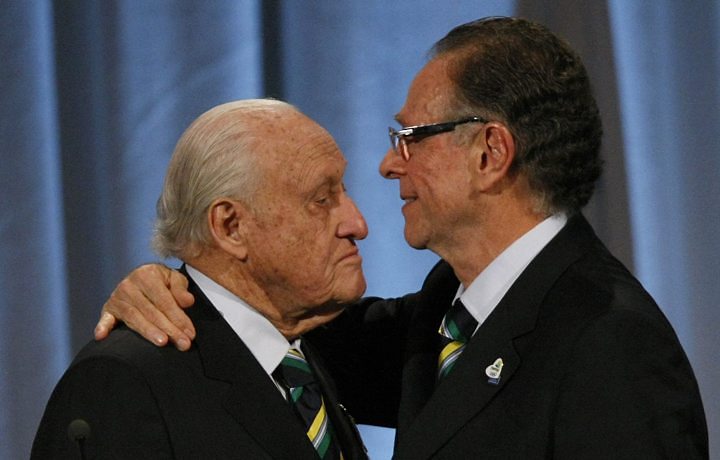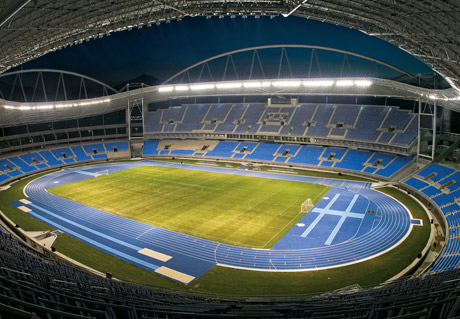By Andrew Warshaw
August 3 – Organisers of the 2016 Rio Olympics have controversially decided to keep João Havelange’s name on their main stadium (pictured) despite the former FIFA President being tarnished by the ISL bribery scandal.
Rio 2016 chief executive Leo Gryner said here today that Havelange, now 96 and all-powerful as FIFA boss between 1974 and 1998, was an “historical icon” of Brazilian sport and that they had no plans to rename the Estadio Olimpico João Havelange.
“Everything he has contributed to the transformation of Brazilian and international sport has served as an example to the IOC (International Olympic Committee),” said Gryner.
Despite Havelange (pictured below, left) and his former son-in-law, Ricardo Teixeira, recently being found to have received millions of dollars in kickbacks from ISL before FIFA’s one-time marketing partner went bust in 2001, the Stadium will retain its name when it stages athletics events in 2016 – a blow for campaigners who want all traces of the disgraced former FIFA supremo and IOC member erased.
“He already paid, he has been punished,” Gryner said.
“I have a lot of pride to be associated with João Havelange.”
Gryner’s stance is supported by Carlos Nuzman (pictured below, right), the President of Rio 2016.

“This is an internal problem for FIFA,” he said.
“President Havelange was one of the most important people in 20th century sport like Juan Antonio Samaranch [the long-time IOC President who stepped down in 2001].
“He changed football.
“However, I cannot give an opinion on the FIFA matter.”
Havelange, a former Olympic water polo player and swimmer, was the longest serving member of the IOC – having joined in 1963 – but resigned last December when it became clear that he faced sanctions over his involvement in the ISL scandal.
Since the Swiss court’s findings were made public, Havelange’s successor as FIFA President, Sepp Blatter, has said that he want him stripped of his title as the honorary President of football’s world governing body.
A campaign has been launched in Brazil for the Stadium, which was opened in 2007, to be renamed in time for the Olympics.
“We don’t want the most modern stadium in South America to carry this stain,” said Rogerio Lessa Benemond, one of the organsiers of the campaign.
“We’ve always been against Havelange’s name on the stadium because he doesn’t represent Botafogo but our opposition has taken on a new lease of life with these accusations.”
The Stadium is home to Botafogo, one of Brazil’s biggest clubs.
Most residents call it the Engenhão, after the working-class neighbourhood in northern Rio where it is located.
Benemond’s group suggested officials name the stadium after Nilton Santos, a Botafogo player who played in Brazil’s World Cup winning sides of 1958 and 1962.
Another group,meanwhile, suggests the stadium be renamed after João Saldanha, the coach who laid the groundwork for Brazil’s victory at the 1970 World Cup in Mexico.
Contact the writer of this story at zib.l1745341238labto1745341238ofdlr1745341238owedi1745341238sni@w1745341238ahsra1745341238w.wer1745341238dna1745341238

